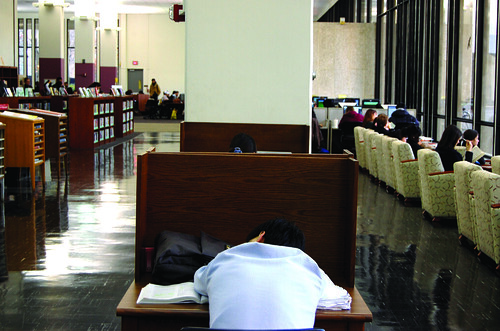In most lecture classes, attendance doubles on test days.
Many college students have found tools designed to supplement learning, like Blackboard and other online tools, as excuses to not go to their classes.
Law and political science professor David Adamany said a lack of attendance reflects the general attitude of students toward college.
“Students are quite casual about attendance at classes. This may reflect a change in attitude toward college generally,” he said. “At one time, the opportunity to attend college was fairly limited, and the students who enrolled were motivated to get an education.”
In associate professor Ralph Young’s classes, turnout is high.
“Attendance is usually excellent. There are always a few who are chronically late or absent,” he said. “I never find more than 10 percent absent.”
When it comes to attendance and preparation, Temple students’ opinions vary.
Freshman architecture major Daniel Donovan said attendance in his lecture classes is not as important as others.
“I don’t always go to all my lectures,” Donovan said. “And while missing a few isn’t the end of the world, missing too many can become a problem especially if you don’t use the time it creates wisely.”
Megan Baumel, a freshman therapeutic recreation major, said she regularly attends her classes, however, does not find the assigned readings to be essential to earning good grades.
“Three out of four of my classes have readings to keep up with on the syllabus. I have not opened any of my books since the first week of classes.”

“I feel like I need to be in all of my classes except for math, which is algebra,” she added. “I have a very easy time, and all the notes are online so there is really not a need to go to class.”
Senior math major Tiana Britton said she feels differently about attendance.
“I can’t afford wasting my money by simply not going to class,” Britton said.
She said she regularly attends all of her classes and keeps up with her assignments.
Britton said she did not find her classes as challenging when she was a freshman, but now, feels the need to keep up with all of her work.
Attendance and preparation for classes depend on the strictness of the professor and the availability of resources outside of class. Many professors put their presentations on Blackboard, which helps students keep up when absent. However, Britton said she still feels she needs to be present.
“It depends on the class and how the professor teaches, with PowerPoint or not,” she said. “But I usually feel like I need to go.”
“Lack of attendance could be due to a number of things such as students’ laziness, other involvements, whether or not the professor takes attendance and even the professors teaching style, lecture, PowerPoint etcetera,” Baumel said.
Adamany agrees technology might make students feel less guilty about missing class.
“An additional factor may be technology. Students are accustomed to believing that everything will be found on the Internet or will be communicated as copies of PowerPoints or will be somewhere available,” he said. “Believing they will get the information they need elsewhere, they may not see a need to attend class.”
Young said poor attendance is only hurts the students.
“Of course it depends on the student. Some grasp an awful lot just from the lectures and class discussion. Some need to do more work than others,” he said. “When students shirk their work, and I did this myself in college, they’re only hurting themselves. If you’re paying good tuition money to go through college why not maximize your investment?”
Students who do not regularly attend class still claim to do well enough with their grades. “There is no doubt that there is a very significant grade inflation, so students who put in minimal effort and have only erratic attendance nonetheless expect to receive honors grades,” he said. “This is a national phenomenon. Three years ago even Princeton [University] had to impose a limit on the percentage of ‘A’ grades instructors could award in undergraduate classes.”
Adamany said reports on Temple grading practices several years ago showed 74 percent of undergraduate grades are ‘A’s or ‘B’s. Some Temple academic programs have higher percentages than others.
“Yet class attendance is spotty, so many students earning high grades are not regularly attending,” he said.
“I cannot make choices for students,” Adamany said. “I set down expectations, carefully prepare for each class, assist students that seek assistance and give examinations that seem to me to give students an opportunity to reflect knowledge gained in the course. The rest is up to students.”
Valerie Rubinsky can be reached at valerie.rubinsky@temple.edu.


If I am able to stay home from work and enjoy my hobbies, and still get a paycheck, would I? This depends on the type of experience I have at my job. If it is routine work with no chance for mental stimulation, then sure, I will choose to stay home. Same goes for classes.
If I can still get good grades by simply reading online lecture notes, then why not? I love the quote, “If you’re paying good tuition money to go through college why not maximize your investment?” Why is it always the students fault? Why not inquire to see if professors are puting forth more effort in engaging students, instead of just disseminating the same information year after year?